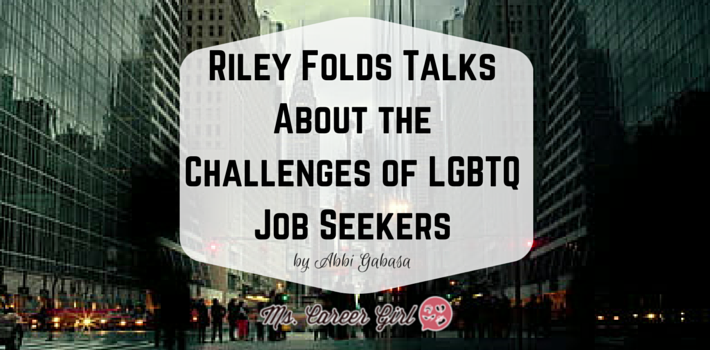Riley Folds Talks About the Challenges of LGBTQ Job Seekers

There are many challenges for job seekers out there, but Riley Folds talks about how members of the LGBTQ community in this year’s graduating class face other trials when trying to get into the workforce.
I’m honored to have had an exchange with Riley Folds, author of the book Your Queer Career, a book described as the ultimate career guide for lesbian, gay, bisexual, and transgender job seekers.
Riley Folds inspires people everywhere with his role as Executive Director of Out for Work, which acts as an element in educating LGBT students the process of assessment and implementation of their career plans before even stepping out into the job market. Out for Work has helped countless individuals with their programs, resources, and assistance in different skills and aspects of career and enhancement of skills to explore career options, master search techniques and strategies and research employment opportunities.
1. What motivated you to write Your Queer Career: The Ultimate Guide for Lesbian, Gay, Bisexual and Transgender Job Seekers? How did this book come to be?
At the time, I had spent the past 10 years traveling to college campuses and conferences educating, preparing, and empowering LGBTQ college students for the transition from academia to the workplace. That was on top of creating and managing the only nonprofit organization with the same mission, OUT for Work. However, my speaking opportunities and OUT for Work could not reach all students. Therefore, I decided that writing a book on the subject would not only be the perfect capstone to my work, but also a vessel for others to be exposed to the information.
2. What is the biggest challenge that the LGBT community face in job searching and their careers?
There’s not a one-size-fits-all answer for that. I think self-evaluation is a big component. Your Queer Career offers an opportunity for individuals to do just that. Also, I think job seekers need to know the laws in the state they want to work in as well as the policies of the organizations that they want to work for. Doing the homework such as this will help the individual find a better fit.
3. What was your career defining moment as a member of the LGBT community? How did it impact your work life?
I write about this in detail in the book. It was early in my career. I left an organization for another I knew was LGBTQ-inclusive. I decided from day one that I would let my supervisor know that I had a partner. I believe it provided the baseline for forming a trusting and open professional and personal relationship. A major component of the workplace is, in fact, the relationships we create. I was able to openly talk about my partner, invite him work functions, and put a picture of him in my office without fear of harassment or retaliation. That experience gave me the conference to grow in my own queer career.
4. If there is one invaluable advice that you would give to an LGBT job applicant, what is it?
Know who you are. Understand that there is an intersection between your sexual orientation, gender identity, and career development. Embrace these attributes as well as all the others that make you who you are. Companies are looking for innovation through the diversity that their employees bring to the workplace. But remember it is your journey and much like coming out to family and friends, coming out in the workplace is a personal choice and should be done on your timetable.
5. How can our LGBTQ readers follow you online or reach you for advice?
I am on LinkedIn. Also, I will be speaking at OUT for Work’s national conference taking place October 9–11th hosted at UT Dallas. More information can be found at www.outforwork.org.

